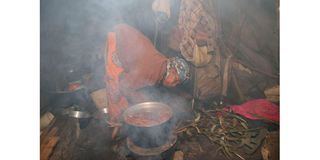Oneya: Save women from the yoke of kitchen fumes this Christmas

A woman cooking with firewood. A 2019 study by CCAK and the Ministry of Energy established that 92 per cent of the rural populations still rely on polluting solid fuels as their primary source of fuel.
What you need to know:
- The idea of a ‘wife material’, bending over a smoky fireplace, blowing into it with all her might has been romanticised.
- Clean cooking is not just about aesthetics. According to the Clean Cooking Association of Kenya (CCAK), more than 21,000 Kenyans die annually from indoor air pollution caused by dirty cooking methods.
‘Tis the season to be jolly. But for the woman in the village who’s expecting visitors from ‘Nairobi’ very soon or is already hosting them, it’s the season for inhaling smoke and compromising the health of her lungs.
Let’s face it. The idea of a ‘wife material’, bending over a smoky fireplace, blowing into it with all her might, then proceeding to produce tasty ugali and chapatis from it, has been romanticised. Never mind that she will leave the fireplace with a blocked or running nose, headache and red eyes.
It’s time to let go of such notions and embrace the use of clean energy. And instead of showering the poor woman with praises, let’s gift her with an LPG gas cooker or any other form of clean energy.
Bear with me as I make my case.
Getting dirty
Clean cooking is not just about aesthetics. It’s not about ‘slaying’ in the kitchen to use a popular derogatory term for women who are deemed to be afraid of ruining their manicures by getting their hands dirty in the kitchen. In some cases, it could be the difference between life and death.
According to the Clean Cooking Association of Kenya (CCAK), more than 21,000 Kenyans die annually from indoor air pollution caused by dirty cooking methods. CCAK also asserts that more than 50 per cent of deaths are children under five years old from pneumonia and acute lower respiratory infections.
And it’s a shame that the women and children in rural areas bear the brunt of this.
In 2019, CCAK, in conjunction with the Ministry of Energy, commissioned the Kenya Cooking Sector Study and it established that 92 per cent of the rural populations still rely on polluting solid fuels as their primary source of fuel.
Solid fuels include coal, long-lasting ovals, peat, charcoal, firewood and wood pellets. Even that jiko you may be so fond of is a culprit.
As we travel home for Christmas and daydream about that piping hot ugali that comes straight from the fireplace, let’s also think about the cost to that woman who will be responsible for it.
Energy awards
Fetching firewood, another romanticised image often used in advertisements and posters about the rural woman, also has dire effects for the woman’s back, and overall health.
Speaking at the African Queen of Energy awards recently, Dr Linda Davis, the CEO and Founder of Giraffe Bioenergy Ltd, decried this “romanticisation of women as beasts of burden”, adding that the firewood on these women’s backs averages at about 52kg per load. She emphasised that it had been proven that it is cheaper to cook using gas than with charcoal, contrary to the popular misconception that the opposite is true.
A policy brief paper published by CCAK in 2020 on the Gains for Women as Clean Cooking Entrepreneurs reiterated, “women play critical roles in scaling the adoption of clean cook stoves and fuels because of their central responsibility for cooking and managing household energy”.
As such, we can contribute immensely to ensuring they embrace clean energy by investing in them and discarding the notion that using solid fuels is akin to being a ‘proper’ woman or wife. In the long run, it’s not just their health or the environment that will benefit. Such a move would be good for everyone.
Miss Oneya comments on social and gender topics. Twitter @FaithOneya; [email protected]





